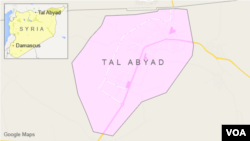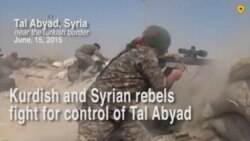Islamic State fighters trying to hold on to a key town along the Syrian border with Turkey may be “cracking” as they try to slow Kurdish fighters and other rebels backed by U.S. air power.
U.S. defense officials Tuesday tried to play down claims by Kurdish YPG officials, who said earlier the town of Tal Abyad had been completely wrested from the grip of the Islamic State group; but, the U.S. officials called the latest push to the outskirts of the town a significant development, which could help alter the course of the fight.
“We are, in this case here, in this location, seeing ISIL forces crack, not interested in fighting, not interested in facing the force that they face,” said Pentagon spokesman Col. Steve Warren.
Defense and intelligence officials say Tal Abyad has long been a critical crossing for the Islamic State, part of a supply route leading to the group’s self-declared capital of Raqqa, to the south.
Equally as important to the Islamic State group, officials say it has been a key crossing point for foreign fighters, who have helped replenish the group’s ranks following ongoing losses, an estimated 10,000 casualties or more, from the U.S. and coalition air campaign.
“ISIL’s inability or unwillingness to fend off Kurdish advances in an area near its de-facto capital shows the impact of coalition efforts to degrade ISIL,” a U.S. intelligence official told VOA on condition of anonymity, using an acronym for the terror group.
The official also said the setback for the Islamic State at Tal Abyad “tarnishes the group’s aura of invincibility.”
The Pentagon described the advance by Kurdish and other rebel forces as being “on the verge” of shutting down a major route for the flow of foreign fighters and supplies to the Islamic State, though it noted the Islamic State does have other routes at its disposal.
Still, the Pentagon’s Col. Warren described the Kurdish advance as bringing the coalition a “significant step closer” to choking off the Islamic State’s ability to operate in Syria.
“This is a great example of air power, devastating air power, along with seasoned, trained and capable ground forces,” Warren said.
As part of the Kurdish and rebel advance on Tal Abyad, the U.S.-led coalition carried out five airstrikes near the town Monday, hitting five Islamic State tactical units and three Islamic State vehicles.
Though they say Tal Abyad remains contested, U.S. defense officials are seizing upon the momentum by Kurdish and other rebel forces there as an indication the U.S. strategy is starting to pay dividends following a string of what they called “well-publicized setbacks” battling the Islamic State in Iraq, including the loss of Ramadi.
"We have been patient, we have been focused. And this week we have seen success," Warren said, adding Iraqi forces were also making progress battling the Islamic State group in the town of Bayji and at the nearby oil refinery.
Still, officials admit there are reasons to remain concerned, including accusations by Turkish officials that Kurdish forces in northern Syria were engaging in "a kind of ethnic cleansing.”
U.S. officials say those claims, while unacceptable if true, have yet to be substantiated.
There are also reasons to question whether the Islamic State group is actually cracking under pressure or whether the terror group’s commanders decided other venues were of greater importance.
Aymenn Jawad Al-Tamimi, a fellow at the U.S.-based Middle East Forum, said in the weeks leading up to the Islamic State group’s campaign to take Ramadi from Iraqi forces, a notice purportedly from IS leader Abu Bakr al-Baghdadi went out to the Syrian provinces, calling for reinforcements.
“ISIS does not have unlimited military resources to wage an intense fight on every front,” Tamimi told VOA via Skype.
“They have to pick and choose where they’re going to try to make their next major move,” he said. “What leads to a more intense focus on one front has to mean less effort devoted to another, in some cases just holding the front line, preventing the enemy from trying to advance.”
U.S. defense and intelligence officials have also said in the past that the Islamic State group is resilient, able to suffer defeats on one front just to pop up and cause trouble somewhere else. And for all the efforts by the U.S. and other Western countries to stem the flow of foreign fighters, officials admit as many as 1,000 a month have been flocking to the Islamic State cause.
Even an estimated 10,000 or more Islamic State casualties have failed to make much of a dent, U.S. defense and intelligence officials saying the size of the Islamic State fighting force has stayed consistent, in the range of 22,000 to 32,000 fighters.
Another key concern is just how far Kurdish fighters and other rebels in northern Syria are willing to go in the battle against the Islamic State.
“If you look at Kurds, in the Kurdistan regional government but also the Kurds in Syria, and you look at their capacity and also the results they were able to achieve and I think that motivation question is a big part of it,” said Brian Katulis with the Center for American Progress.
Defense officials also admit that, for now, there is no cohesive ground force capable of defeating the Islamic State on multiple fronts and that putting one in place could take as much as 10 years.
“There’s no regional force right now,” said Harleen Gambhir, a counterterrorism analyst at the Institute for the Study of War.
Instead, the U.S. is looking at a variety of forces, some very capable, but for now mostly acting on their own accord, giving the Islamic State group enough breathing room to persist.
“It’s never a question of can people, can militaries defeat the Islamic State on the battlefield. The question is their national will to do so,” Bill Roggio, a senior fellow at the Foundation for Defense of Democracies, said via Skype. “There are militaries that are capable of dealing a blow to the Islamic State, but nobody has the will to deploy them."







